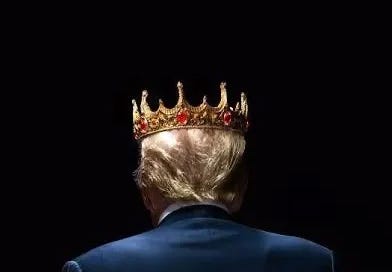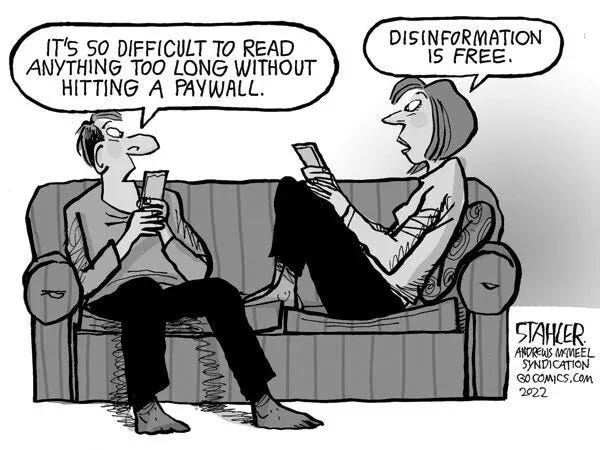The Capitulation Crisis
How the legal system, colleges and universities, media outlets and other decaying U.S. institutions are caving to Trump.
This free newsletter is adapted from today’s Morning Read-In, a daily curation of the most compelling stories on politics, culture, communications, and life. Exclusive to paid subscribers. Click the orange button to get the MRI and join the morning chats!
I bring you two stories, two stunning, unprecedented examples of major U.S. institutions bowing to an imperial president using the power of his office to cow the private sector.
First, Democratic-leaning law firm Paul, Weiss, Rifkind, Wharton & Garrison LLP reached a deal under which President Trump will drop the executive order he leveled against the firm.
Rather than fight Trump’s legally dubious edict, part of his campaign to pull social and political institutions into his power orbit, the firm agreed to serve clients no matter their political affiliation and contribute $40 million in legal services to Trump causes, according to the New York Times.
Members of the legal profession said in interviews that they were surprised by the deal, as it appears as if the firm — which is dominated by Democrats and has long prided itself in being at the forefront of the fight against the government for civil rights — was capitulating to Mr. Trump over an executive order that is likely illegal.
The agreement is a significant development in the retribution campaign Mr. Trump has opened against several top law firms that he sees as having supported efforts to help his opponents or unfairly prosecute him. And it is the latest demonstration of how Mr. Trump has used his power to extract concessions or public signs of support for his agenda from corporate leaders, news organizations and others since his election victory in November
Colleges and Universities
The second story, from Politico, details how U.S. colleges and universities are capitulating to Trump "with staggering speed, moving to slash progressive policies and crack down on student activism as they face compounding threats from an administration hellbent on reshaping higher education.”
Columbia University on Thursday appeared poised to submit to a list of Trump administration demands that threaten core tenets of the school’s mission in an attempt to release itself from a $400 million federal funding freeze. The University of California’s board moved on Wednesday to cut diversity statements from recruitment requirements. Dartmouth College on Monday announced it had hired the Republican National Committee’s former chief counsel — an outspoken critic of birthright citizenship — as the college’s top lawyer and leader of its immigration office. And dozens of universities last month rushed to scrub diversity, equity and inclusion policies from their websites and cancel related events.
It’s a stunning display of how some of the country’s oldest, wealthiest and enduring institutions have swiftly folded to Trump, who is acting on longstanding conservative criticisms of universities as elitist and progressive. In the path of the Trump administration’s threats — and with hundreds of millions of dollars at stake — schools are being tested on how their values, jobs and research stand up to today’s political realities.
Like Trump’s other assaults on institutional freedoms, this one is a long-time coming that came all at once.
A growing number of institutions are initiating hiring freezes, rescinding graduate admissions offers and pausing construction, which may be costly to fire up again even if Congress or a new administration reopens the spigot of cash
Trump’s tactics are largely delivering on years of conservative frustrations accelerated during the pandemic that galvanized voters against academic frameworks like critical race theory and gender identity as well as DEI and pro-Palestinian protests. As early as 2021, Vice President JD Vance — a Yale alum and not yet a senator — declared “the universities are the enemy.”
In Nothing We Trust
Some of you might recall “In Nothing We Trust,” a cover story I wrote for National Journal 13 years ago on Americans' loss of faith in social institutions. We're seeing its worst-case scenario at play now: Institutions designed to be the bulwark against autocracy and anarchy are collapsing beneath the weight of their white flags.
Built around the story of Johnny Whitmire, a disenchanted Obama voter who had lost his home, his job, and his self-respect to powerful forces designed to sustain his life and livelihood, the Muncie, Indiana-based essay captured the start of our ugly era.
Whitmire is a story of Muncie, and Muncie is the story of America. In this place—dubbed “Middletown” by early 20th-century sociologists—people have lost faith in their institutions. Government, politics, corporations, the media, organized religion, organized labor, banks, businesses, and other mainstays of a healthy society are failing. It’s not just that the institutions are corrupt or broken; those clichés oversimplify an existential problem: With few notable exceptions, the nation’s onetime social pillars are ill-equipped for the 21st century. Most critically, they are failing to adapt quickly enough for a population buffeted by wrenching economic, technological, and demographic change.
Thirteen years ago, I asked: “What if, this time, institutions don’t recover—and our faith dies with them?”
People could disconnect, refocus inward, and turn away from their social contract. Already, many are losing trust. If society can’t promise benefits for joining it, its members may no longer feel bound to follow its rules. But is the rise of disillusionment inexorable? Can institutions regain their mojo? History offers hope, but Whitmire’s story, and the story of Muncie, say no.
Sadly, and by coincidence, I read two other stories this morning about decaying institutions.
Permanent Washington
For all its pretense and power, Washington, D.C., is a small and parochial town. When I worked there as a journalist, my kids went to school with the children of Cabinet secretaries, congressmen, and a future vice president. My neighbors included a senior leader of the CIA, a Republican leader in Congress, and a TV news anchor. Which is why I found this story by Michael Schaffer of Politico so compelling:
“Michael Abramowitz and James Boasberg both grew up as children of Washington notables, becoming friends at Saint Albans, the venerable prep school where the local elite has long educated its kids. Their fellow students included future Sen. Michael Bennet (D-Colo.), future White House Chief of Staff Jeff Zients and the sons of a vast array of Washington VIPs ranging from Jesse Jackson to G. Gordon Liddy.”
“After graduating from Harvard and Yale, respectively, the two went into exactly the sorts of careers that this particular world raises its talented young people to admire. One did journalism, the other did law, and they both wound up in public service.”
“And this week, in a coincidence that feels downright poetic in the shell-shocked universe known as Permanent Washington, they’re the targets in high-profile Trump administration onslaughts that are otherwise unconnected: the shuttering of Voice of America, where Abramowitz served as the director, and the battle over the deportation of alleged Venezuelan gang members, where Boasberg is the judge whose rulings have led to furious presidential condemnations.”
Reading the piece safely from my home in Detroit, I felt a tinge of empathy for my old tribe -- DC’s Old Guard. Those dedicated institutionalists. Schaffer’s nut graf captures their plight nicely:
Abramowitz and Boasberg, he writes, “seem like a giant metaphor for a feeling that has consumed the hometown community: a sense that there’s a class war on against the people and professions that represent old Washington’s highest bipartisan ideals, but are viewed as self-dealing leeches by the MAGA base.”
Journalism
For those of you interested in the future of journalism — yet another embattled institution —Dick Tofel’s “Second Rough Draft” Substack has an important first lesson about how we should cover the world now that a Trump-led America is no longer at the center of it.
“We need—that is, our readers, viewers and listeners urgently need—to better understand this new world being forged. That includes not just what the US is doing, and failing or refusing to do, but also what others are doing, both on their own initiative and in response.”
“Above all, it means we need practical access for American readers, viewers and listeners to more original reporting from reporters on the ground elsewhere. Recognizing that the resources do not exist in most newsrooms to expand the very limited number of US reporters posted to international assignments, we are going to require new forms of coordination and aggregation to accomplish this.”
Finally, Tofel leverages history to to argue that coverage by U.S. media outlets must adapt to the end of American Exceptionalism.
“Nine decades ago,” Tofel writes, “isolationism seemed to many Americans a course they might choose. In a world of climate change and global pandemics, of competitive currencies and worldwide markets, there is no such choice available, and journalism needs to convey that reality. We are not organized to meet that challenge today. We need to change how we work and the stories we tell in order to meet it tomorrow.”
Paid subscribers get daily access to The Morning Read-In, where today I curated the most interesting stories on politics, culture, communications, and life.
While most of my newsletters are free, the daily MRI is not. Please subscribe, and get twice as much content that is available under the free plan.
If you’re a die-hard free subscriber, please let me know what I can do to get you to level up.







I would love to “level-up” but we are on a fixed income! I do appreciate your free postings as they keep us informed and engaged. Thank you!
I fear a world where my granddaughter (hopefully goes to College) will face a school that is so white bread that you wonder if the experience was worth it! I also am sad and disgusted that these Universities are bowing to Trump as well, seems to me they could just say no) instead of showing us their cowardice and risk their popularity in the near future. By them refusing to buckle they stand firm in their resolve of all of us and show us they are above a mafia president (putting on the squeeze) as he continues on in his corruption